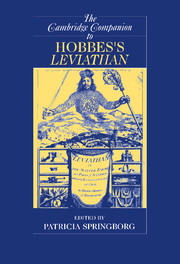Book contents
- Frontmatter
- General Introduction
- Part I: Of Man
- Part II: Of Commonwealth
- 6 Hobbes on Persons, Authors and Representatives
- 7 Hobbes on Glory and Civil Strife
- 8 Hobbes and the Philosophical Sources of Liberalism
- 9 Hobbes on the Right to Punish
- Part III: Of a Christian Commonwealth
- Part IV: Of the Kingdom of Darkness
- Part V: Hobbes’s Reception
- Bibliography
- Index
- Series List
6 - Hobbes on Persons, Authors and Representatives
from Part II: - Of Commonwealth
Published online by Cambridge University Press: 28 November 2007
- Frontmatter
- General Introduction
- Part I: Of Man
- Part II: Of Commonwealth
- 6 Hobbes on Persons, Authors and Representatives
- 7 Hobbes on Glory and Civil Strife
- 8 Hobbes and the Philosophical Sources of Liberalism
- 9 Hobbes on the Right to Punish
- Part III: Of a Christian Commonwealth
- Part IV: Of the Kingdom of Darkness
- Part V: Hobbes’s Reception
- Bibliography
- Index
- Series List
Summary
Hobbes offers his most extended analysis of the linked concepts of authorisation and representation in chapter xvi of Leviathan, the chapter in which he rounds off Part I, 'Of Man', and paves the way for his discussion 'Of Commonwealth' in Part II. This pivotal chapter, 'Of persons, authors, and things Personated', has no counterpart in either of the earlier recensions of his civil philosophy. Nothing like it can be found in The Elements of Law, which he had circulated in manuscript in 1640, nor in De Cive, which he had published in 1642. Hobbes never speaks in these texts of representation or representatives, nor of the underlying suggestion that it is possible to serve as an 'author' who can authorise the performance of an action by someone else. By contrast, in Leviathan these concepts form the bedrock of Hobbes's theory of the legitimate state, and in the Latin version of 1668 he was content to offer a simplified version of essentially the same argument.
Deploying his preferred method of beginning with definitions, Hobbes opens his analysis in chapter xvi without preamble as follows:
A person is he whose words or actions are considered, either as his own, or as representing the words or actions of another man, or of any other thing to whom they are attributed, whether truly or by fiction. When they are considered as his own, then is he called a natural person; and when they are considered as representing the words and actions of another, then is he a feigned or artificial person.
- Type
- Chapter
- Information
- The Cambridge Companion to Hobbes's Leviathan , pp. 157 - 180Publisher: Cambridge University PressPrint publication year: 2007
- 18
- Cited by



